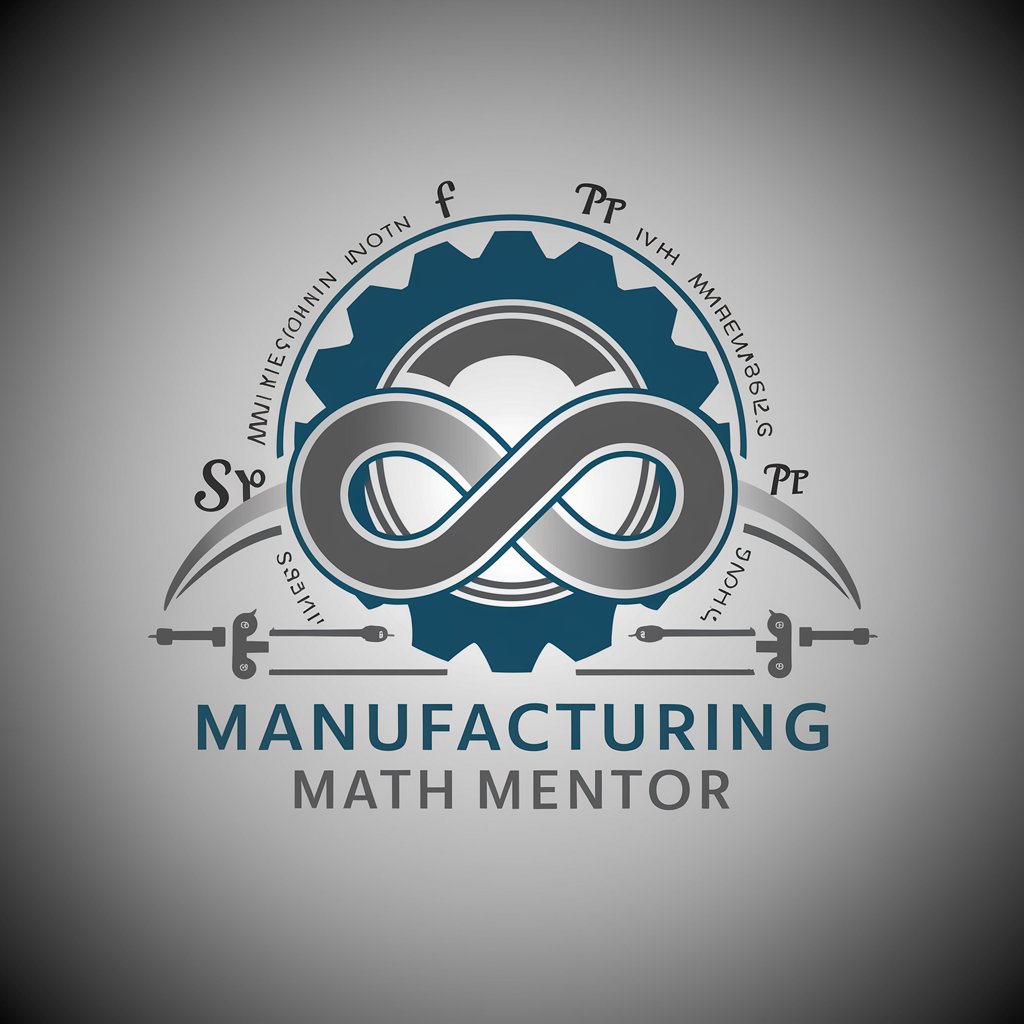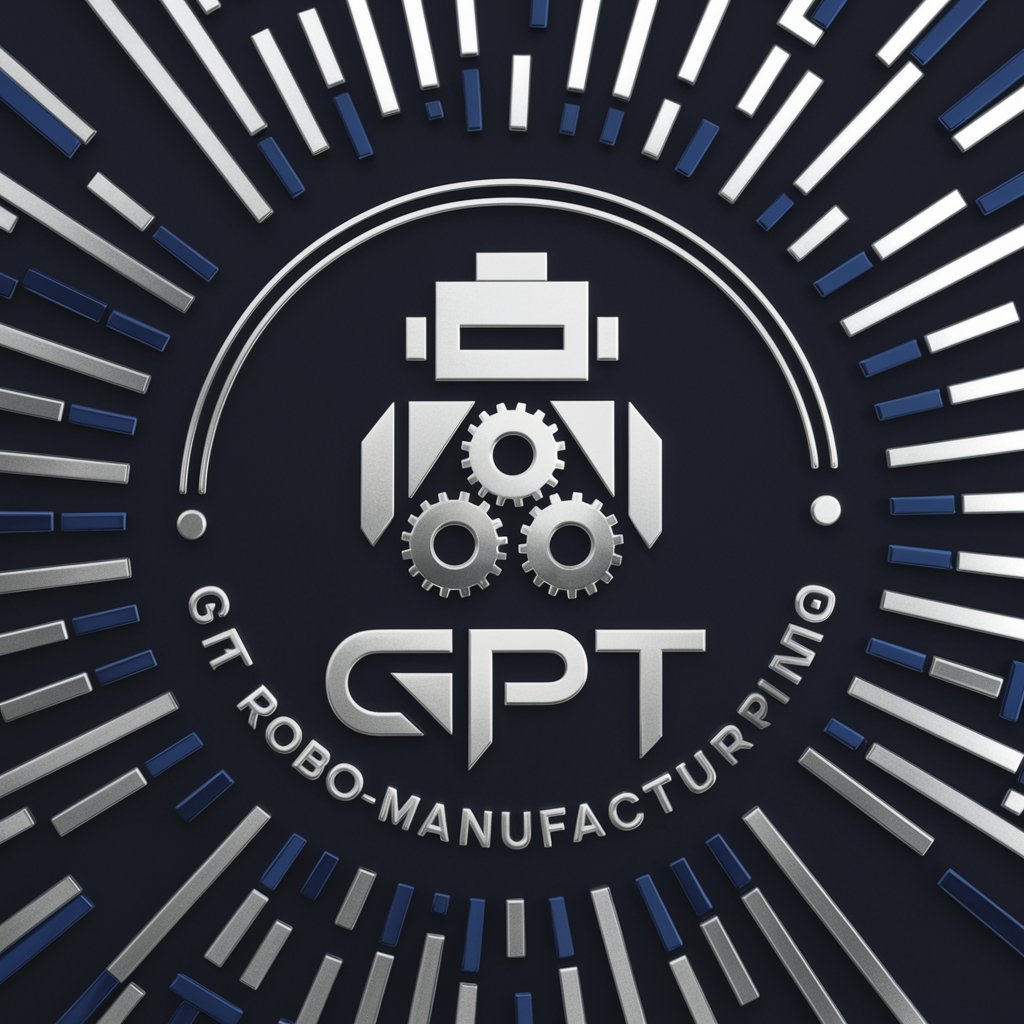
Manufacturing Math Mentor - Manufacturing Math Assistance

Welcome to Manufacturing Math Mentor! Let's solve some manufacturing math challenges.
Empowering manufacturing with AI-driven math solutions.
Explain how to apply statistical process control (SPC) in a manufacturing environment.
How can I optimize production scheduling using mathematical modeling?
What are the best practices for implementing Lean Six Sigma in manufacturing?
Describe a real-world case study where mathematical analysis improved manufacturing efficiency.
Get Embed Code
Overview of Manufacturing Math Mentor
Manufacturing Math Mentor is designed as an educational and advisory tool, specifically tailored for individuals and organizations within the manufacturing industry. Its core purpose is to facilitate understanding and application of mathematical concepts crucial to manufacturing processes. This includes optimizing production lines, minimizing costs, enhancing product quality, and addressing logistical challenges through mathematical solutions. A typical example might be a case where a manufacturing plant seeks to reduce waste and improve efficiency in its assembly line. Manufacturing Math Mentor could provide insights on how to apply lean manufacturing principles, backed by mathematical models, to identify bottlenecks and streamline operations. Powered by ChatGPT-4o。

Core Functions of Manufacturing Math Mentor
Problem-Solving Guidance
Example
Advising on reducing material waste in production.
Scenario
A factory struggling with high material waste might use the mentor to understand and apply concepts like Six Sigma or statistical process control, using data analysis to pinpoint waste sources and reduce variance in production processes.
Optimization Strategies
Example
Improving production line efficiency.
Scenario
For a company looking to optimize its assembly line, the mentor could illustrate the use of linear programming or simulation models to configure the most efficient layout and sequence of operations, thereby reducing lead times and increasing throughput.
Cost Reduction Techniques
Example
Lowering operational expenses.
Scenario
A small manufacturing business aiming to cut costs might be guided on applying mathematical models to analyze and optimize energy consumption, supply chain logistics, and inventory management, leading to significant savings.
Quality Improvement Methods
Example
Enhancing product consistency and reliability.
Scenario
The mentor can demonstrate the use of statistical quality control and design of experiments to a manufacturing unit striving for higher quality, helping to establish control limits and reduce defects.
Target Users of Manufacturing Math Mentor
Manufacturing Engineers
Professionals focused on improving production processes, reducing costs, and enhancing product quality would find the mentor's guidance on applying mathematical strategies to real-world manufacturing problems invaluable.
Operations Managers
Individuals responsible for overseeing manufacturing operations, ensuring efficient use of resources, and meeting production targets would benefit from the mentor's insights on optimization and efficiency improvement.
Quality Assurance Specialists
Experts tasked with maintaining product quality standards and implementing continuous improvement initiatives would utilize the mentor to understand and apply statistical methods and quality control techniques.
Supply Chain Analysts
Analysts looking to streamline supply chain processes, from procurement to distribution, would find the mentor's advice on mathematical modeling and analysis techniques crucial for making data-driven decisions.

How to Use Manufacturing Math Mentor
1
Start by visiting yeschat.ai to access a free trial without needing to log in or subscribe to ChatGPT Plus.
2
Choose 'Manufacturing Math Mentor' from the available tools to start enhancing your manufacturing math skills.
3
Enter your manufacturing-related math query or problem into the chat interface to receive tailored advice and solutions.
4
Use the provided step-by-step guidance and case studies to apply mathematical concepts to real-world manufacturing problems.
5
For optimal experience, provide detailed information about your query, and utilize the tool regularly to improve problem-solving skills in manufacturing contexts.
Try other advanced and practical GPTs
Computer-Aided Manufacturing Tutor
Empowering your manufacturing journey with AI.

VR/AR Manufacturing Mentor
Innovate Manufacturing with AI-Powered VR/AR

Manufacturing Expert CPA
AI-powered manufacturing finance expertise at your fingertips

Manufacturing Insights GPT
Empowering Manufacturing with AI-driven Insights

Musculoskeletal Disorders Advisor
Empowering your musculoskeletal health with AI

Eating Disorder Support
Empowering recovery with AI support

GPT Robo-Manufacturing
Empowering robotic innovation with AI

Sales Rep, Manufacturing Assistant
Empowering Sales and Manufacturing with AI

Additive Manufacturing Advisor
Expert 3D Printing Advice at Your Fingertips

Sustainable Manufacturing Consultant GPT
AI-Driven Sustainability in Manufacturing

Manufacturing Data Analyst
AI-driven analysis for manufacturing efficiency

Manufacturing A13 Expert
Expertise in HemosIL Acustar ADAMTS13 Manufacturing

Manufacturing Math Mentor Q&A
What kind of manufacturing math problems can the Manufacturing Math Mentor solve?
The tool is designed to assist with a wide range of problems, from basic arithmetic and algebra to more complex issues like statistical quality control, production planning, and optimization.
Can Manufacturing Math Mentor help with software specific to manufacturing?
Yes, it provides guidance on using mathematical tools and software commonly used in the manufacturing industry, such as MATLAB, Excel, and specialized CAD software for problem-solving.
Is Manufacturing Math Mentor suitable for students?
Absolutely. It's a valuable resource for students pursuing degrees in manufacturing engineering, industrial engineering, or any field that involves manufacturing math.
How can Manufacturing Math Mentor improve our production process?
By applying mathematical models and solutions offered by the tool, you can optimize production processes, reduce waste, and enhance efficiency and productivity in your manufacturing operations.
Does Manufacturing Math Mentor offer real-world examples and case studies?
Yes, it includes a variety of real-world examples and case studies to demonstrate how mathematical concepts can be applied to solve practical manufacturing problems.